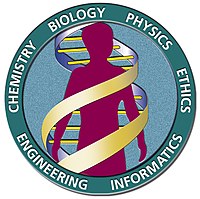
Photo from wikipedia
Characterizing the genomic landscape of cancers is a routine part of clinical care that began with the discovery of the Philadelphia chromosome and has since coevolved with genomic technologies. Genomic… Click to show full abstract
Characterizing the genomic landscape of cancers is a routine part of clinical care that began with the discovery of the Philadelphia chromosome and has since coevolved with genomic technologies. Genomic analysis of tumors at the nucleotide level using DNA sequencing has revolutionized the understanding of cancer biology and identified new molecular drivers of disease that have led to therapeutic advances and improved patient outcomes. However, the application of next-generation sequencing in the clinical laboratory has generally been limited until very recently to targeted analysis of selected genes. Recent technological innovations and reductions in sequencing costs are now able to deliver the long-promised goal of tumor whole-genome sequencing as a practical clinical assay.
Journal Title: Human mutation
Year Published: 2022
Link to full text (if available)
Share on Social Media: Sign Up to like & get
recommendations!